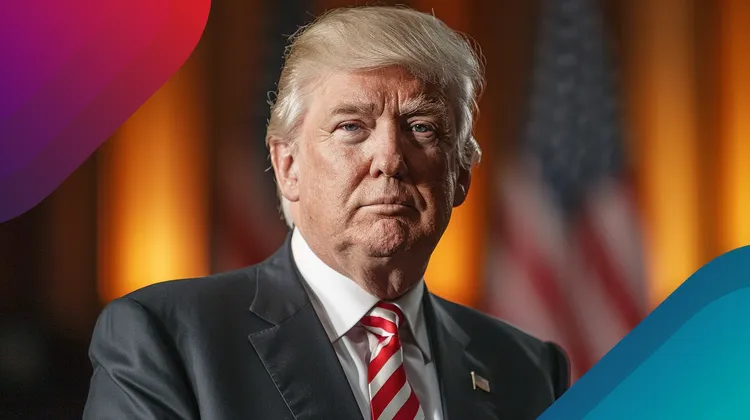
Potential Negative Impact of Trump Win on Crypto
In the constantly fluctuating world of digital currencies, the sentiments of influential political figures can have substantial impacts. The potential re-election of Donald Trump as President of the United States might not be the boon for cryptocurrency that some enthusiasts anticipate. While at first glance, a Trump victory could seem to usher in an era of laissez-faire economic policies favorable to crypto growth, a deeper analysis suggests that this outcome could have adverse effects on the digital currency landscape.
Donald Trump’s penchant for unpredictability is the first of several concerns. Throughout his previous tenure, he demonstrated a willingness to change policies and stances swiftly, often communicated through abrupt announcements on platforms like Twitter. Such unpredictable governance could lead to unstable regulatory environments, where crypto investors and companies face sudden rule changes that could undermine market stability and erode investor confidence. The regulatory clarity needed for crypto to thrive might remain elusive under such conditions.
Trump has openly criticized cryptocurrencies in the past, explicitly targeting Bitcoin and other digital assets, labeling them as instruments for illegal activity. If elected, his administration might impose stringent regulations on the crypto sector to curb what it perceives as risks related to money laundering and fraud. Traditional financial institutions, which Trump has shown favor towards, might receive a regulatory advantage, creating an uneven playing field that stifles crypto innovation and investment.
Another point of concern is Trump’s stance on technological partnerships and trade agreements. His protectionist policies could lead to a more isolated US technology sector, limiting the collaboration necessary for the global growth of blockchain and cryptocurrencies. If the United States positions itself as a silo, deterring international cooperation, the global interoperability crucial for the success of cryptocurrencies could be significantly hampered.
Trump’s record on appointing regulatory officials could also be worrying for the crypto community. Leaders at key financial regulatory bodies such as the SEC, CFTC, and the Federal Reserve, all appointed during his term, may not be as accommodating or forward-thinking regarding digital assets. They could enforce rigid frameworks, hindering the development of regulatory sandboxes that foster innovation within the crypto space.
The impact on the broader economic landscape cannot be overlooked. Trump’s economic policies, marked by tax cuts and increased spending, have led to concerns about inflationary pressures. While some believe inflation could drive more investors towards cryptocurrencies as a hedge, it’s equally plausible that high volatility in traditional markets could make investors more risk-averse, turning them away from the speculative nature of crypto assets.
Trump’s controversial policies on immigration may also inadvertently affect the crypto industry. Restrictive immigration reforms could deter talented entrepreneurs and developers from entering the United States, limiting the pool of talent available to drive innovation in the crypto sector. The technology industry thrives on a diverse and global workforce, and hindering this input could prove detrimental to America’s competitive edge in digital finance.
Trump’s environmental policies, which have historically favored fossil fuel industries, could conflict with the growing concern over the environmental impact of cryptocurrencies, particularly proof-of-work (PoW) based ones like Bitcoin. The crypto community is increasingly pushing for sustainable practices, but an administration that downplays environmental considerations could undermine these efforts, leading to stakeholder pushback and a potential decrease in institutional adoption.
On the matter of taxation, Trump’s administration could take a hard stance on enforcing crypto tax compliance. While taxes are a certainty, arduous reporting requirements without clear guidance could envelop the market in a cloud of legal uncertainty, making the United States a less appealing country for crypto startups and investors.
Trump’s often confrontational foreign policy approach could provoke international friction that destabilizes markets. Such instability tends to lead to conservative investment strategies, and the high-risk profile of cryptocurrencies might see them fall out of favor during periods of heightened global tensions.
The very essence of cryptocurrency — a decentralized, often anonymous form of money — sits at odds with the law-and-order rhetoric frequently employed by Trump. His administration might thus view decentralized finance (DeFi) as something to be tightly controlled or even combated, rather than embraced and integrated into the existing financial system.
While some might speculate that Trump’s business acumen and deregulatory inclinations could benefit the world of cryptocurrency, potential pitfalls abound. A Trump victory might bring a level of unpredictability, regulatory challenges, isolationist tendencies, and market dynamics that could inhibit the growth and mainstream acceptance of digital currencies. As the crypto industry continues to mature, it will undoubtedly seek a more stable and supportive political climate to navigate the intricate path toward mainstream adoption and integration.
5 thoughts on “Potential Negative Impact of Trump Win on Crypto”
Leave a Reply
You must be logged in to post a comment.
Regulation is a double-edged sword for crypto. Clarity yes, stifling innovation no thanks!
Any shift in leadership can bring big changes to crypto. Must stay informed!
Great, just what we needed. Trump’s return might mean more rigorous crypto scrutiny under the guise of “law and order.” Big Brother much?
Trump’s past comments on Bitcoin are worrisome, but who knows how things might turn out?
So much for draining the swamp. Trump’s SEC and CFTC appointments could mean more rigid rules for crypto, drowning out any hope of innovation.